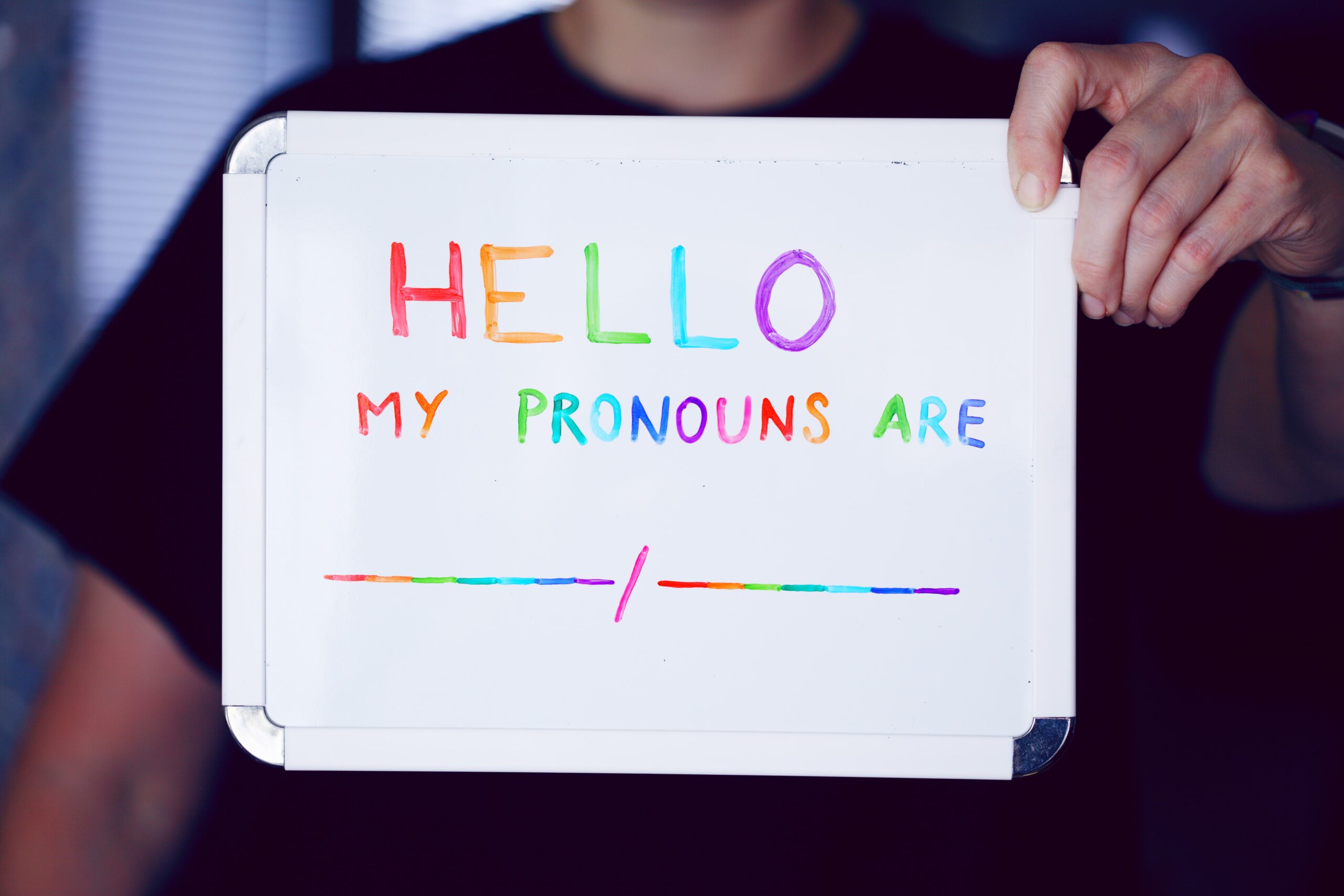No one is forbidding anyone from using the term ‘woman’ or ‘mother.’
On October 15 Rosie DiManno, a Canadian journalist, wrote a contentious column for the Toronto Star, in which she claimed that women were being “erased” because British health care providers were introducing gender-inclusive language to accommodate nonbinary people and transgender men. The practice of referring to a menstruating or pregnant person instead of a menstruating or pregnant woman was, DiManno asserted, tantamount to “blotting women out” and bore a “whiff of misogyny.” DiManno’s grievance mongering, with her anger directed at transgender people, follows a pattern we have come to expect from TERFs—the acronym stands for “trans exclusionary radical feminist”—and their enablers. Almost invariably, they invoke problems that do not exist as a means of preempting the expansion of rights and reasonable accommodations for trans people.
Whether the imaginary problem du jour is “men in dresses” invading public bathrooms or, as in DiManno’s op-ed, the supposed erasure of language that captures quintessentially female experiences, this tactic embodies reactionary politics of grievance and scapegoating. The subtext is that transgender women are “really” men, transgender men are “really” women, and nonbinary people don’t exist. DiManno’s views are widely known to Canadian newspaper readers, and rarely elicit a response, but this particular column received international attention because Margaret Atwood promoted it approvingly on Twitter. This is indeed disappointing. Even more disappointing is that Atwood refused to listen to those who alerted her to the trans-antagonistic nature of DiManno’s commentary. Instead, she doubled down.
Why can’t we say ‘woman’ anymore? https://t.co/ghcQDJgxWE via @torontostar
— Margaret E. Atwood (@MargaretAtwood) October 19, 2021
Before exploring these developments and the key issue of inclusive language in more detail, let me get a couple of things out of the way. First, no one is forbidding anyone from using the term “woman” or “mother.” Secondly, I’m not here to “cancel” an 81-year-old literary icon, even if I had the power to do so. I taught The Handmaid’s Tale in 2018 for an arts and humanities theme course on apocalypse and dystopia in the University of South Florida’s Honors College; and, while I am not planning a return to the classroom, I would teach that book again. Atwood’s novel is an immensely important exploration of what can happen when religious extremism runs amok, with the harm disproportionately falling on women and queer people (“gender traitors” in the terminology of Gilead), and for that reason it is painfully relevant in our time.
As a trans woman, I have no trouble discussing access to abortion care as a woman’s issue, although it doesn’t fit exclusively under that rubric because it also affects trans men and some nonbinary individuals, which makes it also an LGBTQ issue. Nor is access to abortion an issue that affects all women. Cisgender women who are unable to conceive, have had hysterectomies, have gone through menopause, or who have certain intersex conditions, are not personally affected by abortion access issues, but no one would get defensive about applying the word “woman” to people in most of those categories.
I would like to pause here to point out that I unabashedly typed “woman” or “women” five times in the above paragraph, because in each case that was the most fitting term. In addition, in my recent commentary on Brittney Poolaw’s horrific manslaughter conviction in Oklahoma for suffering a miscarriage, I used the word “women” 10 times; by contrast, I used the inclusive phrase “anyone who can get pregnant” just once.
To the second point above— i.e., the issue of “cancel culture”— it should go without saying that criticizing the views of a public figure is not censorship. A highly visible public figure should expect that the expression of their opinion on political concerns will elicit a variety of responses and should be prepared for criticism. Even if one is not a public figure, the right to free speech is not the same as an exemption from consequences for expressing hateful or bigoted views.
In addition to the degree of offense, power dynamics should be taken into consideration. This should be axiomatic for feminists. And yet, when it comes to these issues and “cancel culture,” anti-trans self-described feminists are suddenly unable to understand that women (see what I did there?) like Atwood, gazillionaire Harry Potter author J.K. Rowling, and DiManno are not vulnerable people who have to worry about financial insecurity or access to healthcare. They all have white and cis privilege, and they have far more power than the average woman. Trans people, by contrast, are disproportionately poor, highly vulnerable to “cancellation” via scapegoating, likely to face barriers to healthcare access, and, especially in the case of Black trans women, disproportionately subjected to violence up to and including murder.
There is one issue DiManno raised on which I agree with her and, by extension, Atwood: the anatomy of the female reproductive system has historically been erased due to patriarchy and puritanism. Encouraging girls and, indeed, all of us to have a better understanding of the vulva, the clitoris, the cervix, the uterus, and so forth is something our society needs. Jennifer Gunter’s 2019 bestseller The Vagina Bible was a much needed intervention, and I am very glad it exists. At the same time, there is something very odd about women who identify with feminism, a movement that has sought to decouple a woman’s value from reproduction and childrearing, to suddenly wish to define women precisely in those terms so long as it means not having to accommodate “those people.”
Regarding inclusive language, I disagree with DiManno and Atwood’s claim that using it as a means of accommodating some people who can get pregnant undermines the goal of increasing literacy about female anatomy and reproduction. DiManno completely misrepresented the facts to make her case, by referring to an article in The Lancet about UK hospitals using gender-neutral language to accommodate transgender men and nonbinary people. As Stacy Lee Kong points out, rather than prescribe that language across the board, “What did happen is Brighton and Sussex University Hospitals NHS Trust announced in February that it would be adding new trans-friendly terms including ‘birthing people’ and ‘chestfeeding’ to its existing vocabulary as a way to become more inclusive. The hospital was careful to note that it would only be using gender-neutral language in its internal communications and meetings, and that staff would use patients’ correct pronouns while caring for them.”
Intentionally or not, there is a great deal of dishonesty among the handwringing “why can’t we say woman anymore” crowd. That Atwood would throw in her lot with them is more disappointing than surprising to those who have been paying attention, since, as Kong also highlighted in her commentary on the current dustup, Atwood has previously reveled in being a self-described “bad feminist.”
The evolution of language, which is often pushed along by activists and advocates for marginalized communities, is understandably something that can make people uncomfortable. And indeed, activists sometimes go to excesses, though trans rights activists have so little power that the issue is mostly a red herring. Meanwhile, discomfort is sometimes necessary in order to learn and grow. And there is simply no excuse for distorting, exaggerating, and lying about what is really happening when healthcare systems, which often discriminate against trans people, begin to move toward understanding and accommodation. That thoroughly reactionary response is antithetical to the spirit of feminism as I understand it. Atwood seems uninterested in addressing her critics in a serious way, but if she should happen to read this column, I would ask her to look at the actual facts rather than the distorted version found in DiManno’s column, to sit for a while with her discomfort, and to consider leaving the politics of fear, scapegoating, and scarcity to the reactionary Right.



